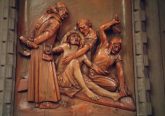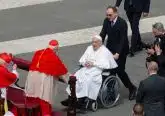Area faith leaders, groups address immigration issue
August 10, 2011
By Eileen Connelly, OSU
ARCHDIOCESE — Archbishop Dennis M. Schnurr joined with other faith leaders within the Metropolitan Area Religious Coalition of Cincinnati (MARCC) June 23 to publicly announce their shared principles and lend a moral voice to guide Ohio’s conversation on immigration.
The 16 members of the interfaith coalition decided to focus on the issue of immigration during a conference last November. At the same time, the Utah Compact, a declaration to guide that state’s discussion on immigration, was supported by religious and business leaders, as well as law enforcement agencies, Utah’s attorney general and other organizations. In January, the executive board of MARCC decided to draft a principles statement with the goal of working toward an Ohio Compact. The principles focus on the areas of federal government, law enforcement, families, the economy and a free society.
In addition to Archbishop Schnurr, supporters of the declaration of principles included the Association of Unity Churches, the Baptist Ministers Conference of Greater Cincinnati, the Cincinnati Islamic Center and the Episcopal Diocese of Southern Ohio. The statements of support along with the principles were sent to Ohio Attorney General Mike DeWine. At press time, there had been no response, according to Tony Stieritz, director of the archdiocesan Catholic Social Action Office.
“The Catholic Church continues to push for a reform of the federal immigration laws of our country,” Stieritz explained by way of background for the issuing of the principals.
“Our nation is still grappling to find a more effective balance between regulating the flow of those incoming and welcoming newcomers to our land. We believe in the indispensible rule of law. That is a matter of social justice in itself. However, we don’t believe that the violation of civil immigration law must always result in the tragedies of family separation, loss of livelihood, inhumane detentions and overall pain resulting from deportation, especially when the laws are out of sink with the economic and social realties of our times.”
“The issue for us is not to encourage law breaking, but to fix the laws that make it almost impossible to come here in the first place,” he added. “Sadly, Congress failed to fix the system. As a result, we are left with immigrant families who, because of their immigrant status, are easily exploitable. They stay because it is the only way to earn a living and build a future, but they live in constant fear of deportation from their loved ones. The issue becomes especially challenging when state or local law enforcement take it upon themselves to proactively enforce federal immigration laws.”
In certain communities, Stiertiz said, it is a regular occurrence for an immigrant, who has committed a low-level misdemeanor or traffic violation to end up being detained, held on an unaffordable bond and eventually deported. Once that happens, he noted, federal law dictates that the migrant cannot even attempt to reenter the country legally again for up to 10 years.
Father Mike Pucke, pastor of St. Julie Billiart Parish in Hamilton, where approximately one third of the parishioners are Hispanic, shared the example of an immigrant mother who was arrested and detained for a minor traffic violation. While she was being held in jail, her child, whom she was still nursing, ended up in the emergency room of a local hospital. The child is fine, but the mother is still under the threat of deportation.
Dina Beech, a lay Comboni Missionary involved in outreach to the Hispanic population at St. Julie, noted a case in which the local community came together to support an immigrant mother. The woman, in advanced stage cancer, was referred for in-home hospice, but wanted to return home to Mexico.
Beech developed a relationship with her, taking her meals and sharing prayer. With the assistance of Mercy Hospital Fairfield and a donation from the parish’s St. Vincent de Paul conference, funds were made available for the woman and her two youngest children, accompanied by Beech, to return home at the end of June. At press time, she was doing well and enjoying her remaining time with her family, Beech said.
In his statement, Archbishop Schnurr also cited examples of immigrants being taken advantage of by their employers, who exploit their fear of deportation to deny them their wages or fire them if injured on the job.
“Our agencies have also received calls from victims of heinous crimes, including battered women, who refrain from reporting abuses to local law enforcement for fear of being permanently separated from their families,” he said, adding that, “regardless of whether or not these human beings carry the right documents, we all deserve to look to law enforcement agencies for protection and safety and without this fear or dread.”
The archbishop continued by saying, “I want to take this opportunity to applaud all of our brave, local law enforcement officers who proactively work to build bridges of trust in our immigrant communities. They are the ones on the front line who choose not to instill fear, but to forge positive relationships with immigrants and win their cooperation to solve real crimes. Their valiant efforts exemplify how state and local public servants can best keep all of us safer as we all continue to wait for comprehensive immigration reform.”
The archdiocesan Hispanic Ministries Office, Su Casa, the Social Action Office and other agencies have been meeting with several local police departments and “what we are discovering,” said Stieritz, “is that what they want more than anything is to build trusting relationships with immigrant communities”
He said the Springdale Police Department recently announced a change in policies so that officers will no longer facilitate the deportation for immigrants guilty of a non-jailable offense.
“They came to the realization that instilling fear of local law and health officials in certain groups of residents only made everyone feel less safe,” he said. “In the absence of federal reform, these public officials are forced to walk a very difficult line. They deserve our admiration and cooperation.”
Stieritz said the various groups have also been working to help area Catholics become exposed to church teaching on migration and the realities faced by immigrant families. For example, the Catholic Social Action Office and Advocates for Justice Greater Cincinnati Parish Collaborative have designed a presentation titled “Restoring Order and Human Dignity,” featuring a panel of experts able to address such topics as how the immigration system works, the history of immigration in Cincinnati, and pastoral realities of serving immigrants.
For more information, contact the Social Action Office at 513-421-3131, or visit www.catholicincinnati.org/Social Action.













